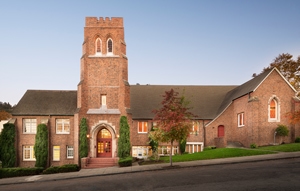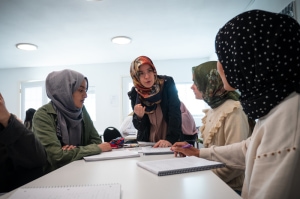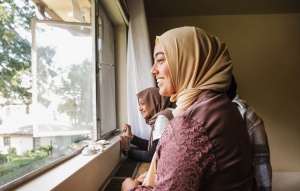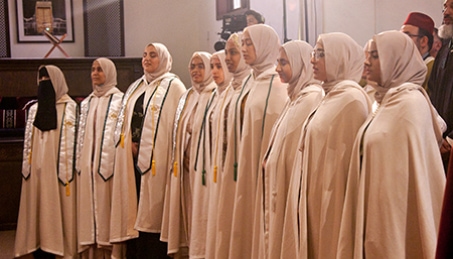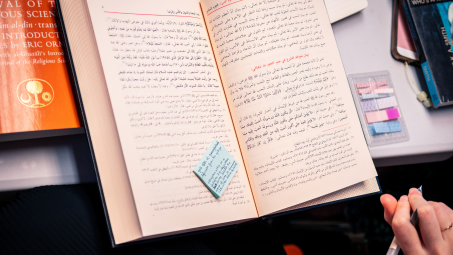Student Achievement
Defining Student Success
Our degree programs aim to educate students to become morally, intellectually, and spiritually accomplished individuals who are committed to serving society in ways commensurate with their gifts on the one hand and the needs of human society on the other. A common practice among higher education institutions involves measuring student achievement and success primarily through data such as student retention rates, graduation rates, job placement, and starting salaries. At Zaytuna College, while we recognize and track that data, we also measure student achievement or success through indicators of their cumulative learning and growth, including the writing and reasoning abilities reflected in their thesis, their love of seeking knowledge, and their commitment to the commonwealth.
While we recognize and applaud the many Zaytuna alumni who matriculate into reputable graduate programs, secure gainful employment, and engage in noteworthy acts of public service, we also celebrate the successes of those students who exude a love of learning, maintain general well-being, and show good adab with God and with others. The term adab encompasses a complex set of meanings that includes decency, comportment, decorum, etiquette, manners, morals, propriety, and humaneness. The contemporary Muslim philosopher Syed Muhammad Naquib al-Attas explains that adab involves the “recognition and acknowledgment of the reality that knowledge and being are ordered hierarchically according to their various grades and degrees of rank, and of one’s proper place in relation to that reality and to one’s physical, intellectual, and spiritual capacities and potentials.”
At Zaytuna College, we consider our program successful if our graduates, after having delved into sacred scripture and the liberal arts as traditionally understood, find success in the career of their choosing, and also leave imbued with a love of learning knowledge and its requisite responsibilities. We recognize the practical importance of real-world needs after graduation (reflected in some of the positive indicators below), and we also want our BA and MA graduates to leave Zaytuna prepared for and committed to a lifetime of growth, learning, and service. Albert Einstein notably stated “The value of an education in a liberal arts college is not learning of many facts but the training of the mind to think something that cannot be learned from textbooks.”
Program Learning Outcomes
The learning outcomes of our degree programs define curricular success in each program, further supported by course learning outcomes at a deeper level.
Graduates of our Bachelor’s program have acquired the tools of lifelong learning, a solid foundation in the Islamic and Western intellectual traditions, the ability to conduct interdisciplinary and holistic analyses with attention to contemporary relevance, and an understanding of the importance of moral commitment and service.
Upon completion of the Master’s program, our graduates acquire advanced skills in reading and interpreting traditional Islamic texts in the stated fields of research; advanced Arabic reading and speaking skills; fluency in dialectical and didactic elements of time-tested teaching methods; and a broad understanding and exposure to other fields of study, such as Islamic intellectual history from its roots in Arabic language and literature, Qur’an and Qur’anic commentaries, hadith tradition and commentaries, law, philosophy, theology, and Sufism.
Signs of Student Success and Achievement
POST-GRADUATE ACTIVITIES
Our graduates pursue a wide range of professional and educational opportunities. Some continue their studies at top-notch universities in realms like medicine, law, and engineering, and Islamic Studies. Others embrace leadership and service in the corporate realm, the nonprofit sector, or even create their own organizations. Wherever they go next, the , all of which we see as reflective of the firm grounding in both the Islamic and the Western intellectual traditions, as well as a foundation in the liberal arts.
Some students show up in more than one category below due to their own trajectory in pursuing studies or employment, and some others are not reflected in the data because they have taken gap years to do independent studies. The percentages below reflect both the BA and MA program graduates.
More than half of past Zaytuna students pursue further studies (55%)
Employment in a full-time or part-time capacity (54%)
Employment or volunteer work in the field of education in teaching, tutoring curricular development, or instructional design (35%)
Community service projects, including delivering sermons (khutbahs), or working for community service organizations, whether paid or as volunteers. (18%)
FURTHER GRADUATE STUDIES INCLUDE
-
Religious studies, Islamic studies, Islamic texts, chaplaincy (25%)
-
Medical school, pharmacy school, or pre-med programs of study or research (14%)
-
Law school or other legal career paths (10%)
-
Humanities, philosophy, liberal arts, global affairs, behavioral science, or journalism (10%)
THE CAPSTONE BA AND MA THESIS
The best liberal arts programs aim to inculcate excellent analytical skills and a compelling writing style in students. A key indicator of their success involves their ability to conduct serious research and present the findings. To that end, each degree program culminates in a capstone thesis on a topic chosen by the student.
MA Theses
Previous MA Theses
-
Islamic Law and Modernity: A Study of Riba in Contemporary Islamic Thought
-
Between Consequentialism and Divine Command Theory: Early Ash’arism Revisited
-
The Shape of Being: The Role of Transcendental Philosophy in Ibn Sīnā
-
The Parameters of Fatwa and Determining a Scholarly Methodology for Minority Law
-
Free the Necks: Slavery and Islam
BA Theses
Previous BA Theses
-
Islamic Economics, Bitcoins & the Cryptocurrency Revolution
-
On the Principle of Unity and Self-Reversion in Metaphysics and Mysticism
-
Finding Common Ground in Troubled Times: A Comparison between Maimonides' Thirteen Articles of Judaism and Ash’arite Theology
-
An Evaluation of the Success of Kant’s Question: ‘How is Synthetic A Priori Knowledge Possible?’
-
Why Medicine Needs Metaphysics: A Comparative Study Between Ibn Sina’s Humoural Medical Theory and Modern Medical Theory
-
Metaphysical Foundations of Contemporary Islamic Economic Thought
-
The Enlightenment Roots of Ideological Islamism
-
Wherefore Art Thou: A Response to Modern Tragedy
-
The Tragedies of Shakespeare: Reading the Man, God, Spirit Triad Through the Lenses of Islamic Metaphysics and Virtue Ethics
-
A Synchronic Approach to the Exegesis of the Qur'an: Upholding and Dispelling the Tahaddee of the Qur'an Through its Rhetorical Structure
-
How Does Our Humanity Justify Our Status as Accountable Beings?
-
Discovering a Sunni/Orthodox Islamic Liberation Theology
-
The Goals of Punishment: Comparing Sharī‘ah-based Criminal Punishment to Utilitarian Penal Ethics
PRECEPTORIALS
Among the signs of a student’s love of learning is the variety of preceptorial course enrollments. The preceptorial represents a modified version of the Oxford tutorial and uses the term Woodrow Wilson introduced at Princeton University in 1905. In preceptorials, a small group of students (or even a single student) meets with a faculty member for at least the length of a semester to study a single text, a single author, or a narrowly defined theme from the Western or Islamic canons. Thus, preceptorials may be used to further personal interests or explore new areas of study but are ideally used for topics connected with a student’s thesis. Over 65 preceptorial courses have been offered over the last five years. Examples of preceptorials are below:
Student Retention Data
Retention Rate
Cumulative
2017-2018
2018-2019
2019-2020
Graduate Program
100%
N/A
100%
100%
Undergraduate Program
74%
56%
84%
85%
Data as of August 2020.
Given the specialized nature of the Master’s program—including strict admissions criteria, small class sizes, and focused areas of concentration—Zaytuna maintains a 100-percent retention rate. The undergraduate retention rate has been steadily rising over the last four years, partially due to a more competitive admissions process to facilitate enrollment of students who are more likely to succeed in our rigorous program of study. Additionally, over time, undergraduate applicants and their families have become better informed about the program offerings before seeking admission. The college has also increased its efforts and resources to provide ongoing support to undergraduate and graduate students through tutoring, advising, and fostering a learning community of students. Lastly, we also believe that the cohort system at Zaytuna, where students study together outside the classroom and tend to help each other improve, facilitates their success.
Student Graduation Data
Graduation Rate
Cumulative
2017-2018
2018-2019
2019-2020
Graduate Program
83%
N/A
N/A
63%
Undergraduate Program
64%
63%
65%
79%
Data as of August 2020.
The graduation rate for our Master’s program is approximately 40% higher than that of neighboring institutions which offer similar programs of study. We believe this results from the commitment of our students and the attentive care given to them by our faculty. Although the undergraduate graduation rate is slightly higher than the national average for four-year private institutions, Zaytuna has witnessed a general upward trend. Historically, based upon our research, the attrition rate of undergraduate students has resulted from the challenging nature and rigor of studying and applying the Arabic language throughout the four years. For this reason, the majority of students who have left did so in the first few semesters. While we are committed to increasing Zaytuna’s graduation rate with additional supportive structures, we will not compromise the high standards of excellence required of our students to do so. One goal we have identified to achieve this involves more rigorous admissions assessments to ensure the potential student’s capacity to succeed in the program, especially in the area of Arabic acquisition.
